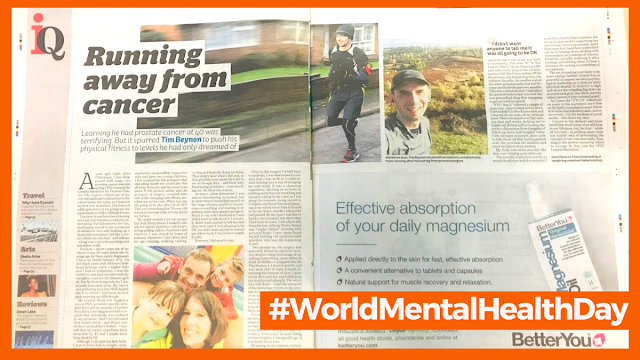Two days after Christmas last year I was diagnosed with stage two prostate cancer and, in a little over five months time, I’ll be running the London Marathon for Prostate Cancer UK. The latter, however, is not the only surprisingly good thing to have come out of the former, cancer has given me a renewed enthusiasm for running and a far greater appreciation of the role physical activity can play in tackling anxiety. Granted, it’s also robbed me of my core strength and confined me to the sofa at times, but today - as I embark on training for my first ever marathon - I find myself oddly grateful to it for giving me the opportunity to fulfil a lifelong dream.
I am now 41 and have been running since my mid-twenties, routinely undertaking 5KM for fun, challenging myself to the occasional 10KM race and chalking up a single half-marathon. I am also addicted to Strava, have two pairs of running trainers and am partial to the occasional banana. I feel like a runner, albeit one who has a long way to go until he’s anywhere close to being ready for a marathon.
Prostate cancer, however, came out of nowhere. I was 30 years below the average age for those newly diagnosed - I have no family history, I’m not black and I had no symptoms. I was, in fact, the 10,000-to-one rank outsider unlucky enough to contract the disease aged 40. But far from being unlucky, I was actually extremely lucky. My cancer was picked up at a free NHS health check to which I had been invited upon entering my fourth decade. My routine blood test flagged a raised PSA (prostate specific antigen) level and six-months of further tests later, I was diagnosed with a tumour that, thankfully, was confined to my prostate. Had I not attended that health check - and 60% of those invited don’t bother - I was told that my cancer would have been incurable by 45 and I would have been dead by 50.
These are sobering words to hear and although I can now see how lucky I was to have had it caught early, the months between that first blood test and diagnosis were dark. I am married to an incredibly supportive wife and have two young children. However, I felt numbed by the prospect that this thing inside me could take this all away from me, and me away from them. It felt grossly unfair and the prospect of surgery, coupled with talk of life changing side effects, terrified me to the core. What was my life going to be like after all of this? This was something that 70-year-old men have to cope with, not me, not in my 40s.
My mind wouldn’t let me escape this fear either. Everywhere I looked I saw adverts for cancer charities and, if it wasn’t heartstring-pulling videos of patients and relatives, I was struck by bouts of jealousy whenever I would see other men my age running, walking, talking, cycling and basically doing anything. They didn’t have what I did and, as they gleefully went about life it felt to me like they - and their fully-functioning prostates - were mocking me. My head was a mess. At times, when distracted, I was almost functioning as normal, but at other times I would find myself on the verge of tears, unable to concentrate on anything and wanting to do nothing more than sleep to escape it. Much to my wife’s frustration I also didn’t want to talk about it. I certainly didn’t want anyone to tell me that they were sure it was all going to be ok, nor did I want anyone to remind me of how lucky I was to have caught it early. In my book, it wasn’t good to talk.
However, it was good to run.
Prior to the surgery I would have to undergo to rid me of the offending gland, I was determined to ensure that I was as fit as I could be. Running was therefore both a means to potentially minimising my recovery, and to escaping my own mind. I became a bit obsessed, increasing the time and distance in the weeks before I went under the knife and rerunning the same routes over and over again, driven by a desire to improve my average pace and secure an upward curve on my ‘matched runs’ graph. It was a cleansing experience, allowing me to focus on nothing more than my breathing and my pace, taking in the canal as I ran along the towpath, losing myself in Coldplay and Snow Patrol and glancing perpetually at my watch every time it buzzed to let me know another kilometre had passed.
By the time I was due to head to the hospital I was ironically fitter than I had been in years. I felt physically fantastic but, with my Strava trophy cabinet bursting with PBs, I once again found myself battling the unanswerable question; why was this happening to me?
Fast forward two months. My surgery went well, as did my physical recovery, despite a large percentage of my waking days being spent either in front of Netflix or plugged into the PS4. I healed quickly and was soon able to walk around, increasing the amount of time I spent on my feet each day and building up my stamina and strength. The worry was still there - I had the prospect of the pathology report on my prostate to come and the blurred images of an uncertain future in regards to elements of my life in the long term - but focusing on my physical recovery helped to take my mind away from these unknowns.
Seven weeks after surgery the nurses gave me the green light to attempt a run. My insides had healed enough to handle the impact of feet on pavement, so as long as I didn’t beast myself or start lifting serious weights, I was good to go. It was music to my ears.
Strapping on my trainers, mentally contemplating a route, choosing a playlist on my phone and locking on to a GPS-signal felt like I was on my way back to normality. This was ‘F*ck You Cancer: Run 1’ on my Strava profile and every step of the 3.9KM felt like I was casting off the blood tests, the hospital gowns, the catheter, the pills, the needles and all the other paraphernalia that had become my life for the past two months. This was a freedom that I had taken for granted before and was now the unprescribed drug that was going to get me back to myself. I knew from that first run that I was going to get out as much as I could and use the analytics in Strava to track my progress as I went.
FYC: Run 2 followed a couple of days later when I returned to work, I stretched it to 5KM and I shaved 20 seconds off my average pace. This continued over the coming days and weeks, helping me to regain my fitness and providing the perfect distraction from thoughts of follow-up tests and hospital visits. I felt stronger in myself, more able to talk about all that had happened over the previous six months and more in control of my anxiety. My body and mind also felt like they were helping each other out and the ability to visually see my average pace figures gradually climbing back up the ‘matched runs’ graph, towards my pre-surgery times, was hugely encouraging.
The benefits of physical activity in regards to mental health are well documented and proven. Indeed, I work for a charity that combines the two in its approach to supporting fire and rescue service personnel and I have seen firsthand how powerful it can be in helping those dealing with tremendous psychological trauma. However, actually realising it after reading and writing about it from a distance for so long is somewhat of an epiphany moment. The act of pushing your body to do more and go further clearly has as powerful an impact on one’s psychological wellbeing as it does on one’s physical health. It delivers a high that no man-made chemical or intoxicant can and clears the crippling fug that can descend and grip you when anxiety takes control of your rational mind.
As someone who hates taking pills and the concept of ingesting anything artificial to alter one’s mood, running strikes me as mother nature’s gift to us all. It is free, it requires no membership or fancy equipment, no prescription and no one else. It is a pastime that brings nothing but benefits to the human body and, as I pass the FYC70 milestone en route to the start line in Blackheath on 28 April, I continue to meet fellow first-time marathoners and cancer survivors - via the medium of social media - who share my view.
Cancer is the darkest and most terrifying word many of us will hear in our lifetime, but the fear - while all too real - is nothing more than our mind’s way of processing the concept of our own mortality. Running is the perfect means by which to escape it. It worked for me, and I’m convinced it will work for you.
See you for FYC London Marathon next year.
![]() Next step: Join the conversation in our Facebook Group
Next step: Join the conversation in our Facebook Group






No comments:
Post a Comment